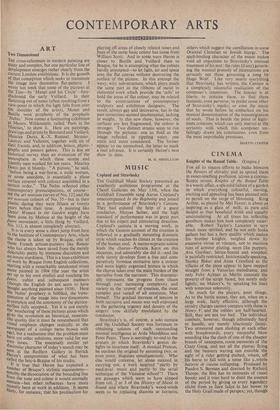MUSIC
Copland and Stravinsky
THE Guildhall Music Society presented an excellently ambitious programme at the Chenil Galleries on May 13th, when the Guildhall Ensemble sang Aaron Copland's unaccompanied In the Beginning and joined in a performance of Stravinsky's Cantata. They had enlisted the help of a guest conductor, Matyas Seiber, and the high standard of performance was in great part due to his expert and stimulating direction. Copland's cantata is a moving work, in which the Genesis account of the creation is followed in a gradually mounting dramatic style which reaches its climax in the creation of the human soul. A mezzo-soprano soloist leads the chorus—Patricia Kern on this occasion, and admirably she did it—and the style slowly develops from a free and com- paratively formless recitative into a stricter and more highly organised texture in which the chorus takes over the main burden of the narrative from the narrator. This dramatic- ally represents the progress from chaos through ever increasing complexity and variety to the 'crown' of creation, the most complex and varied of all creatures, Man himself. The gradual increase of tension in both narrative and music was well expressed in the gathering urgency and density of the singers tone skilfully modulated by the conductor. Stravinsky's is, of course, a solo cantata and the Guildhall Society was fortunate in obtaining soloists of such outstanding musical intelligence as Arda Mandikian and Peter Pears. There is seemingly no end to the avatars in which Stravinsky's genius de- lights to incarnate itself. A musical Proteus, he outdoes the original by assuming two, or even ,more, disguises simultaneously. Who else would conceive, let alone succeed in carrying out, a work inspired "partly by mediaeval music and partly by the serial technique of the Viennese school"? There are passages which seem to have slipped from vol. 2 or 3 of the History of Music in Sound and where Stravinsky's wood-winds seem to be replacing shawms or "cornetts, others which suggest the cantillation in some Oriental Christian or Jewish liturgy. The spell-binding character of the music makes void all objections to Stravinsky's unusual treatment of his text: the rules (if any) govern- ing the musical prosody of incantations are certainly not those governing a song by Hugo Wolf. Like very nearly everything that Stravinsky has written, the Cantata is a completely successful realisation of the composer's intentions. The listener is at liberty to criticise these, to find them fantastic, even perverse; to prefer some other of Stravinsky's masks; or even the music that he wrote before he , embarked on his musical demonstration of the transmigration ot souls. That is beside the point of legiti- mate criticism, which can only marvel at the certainty with which this composer un- failingly draws his conclusions, even from the most improbable premisses.
MARTIN COOPER


































 Previous page
Previous page